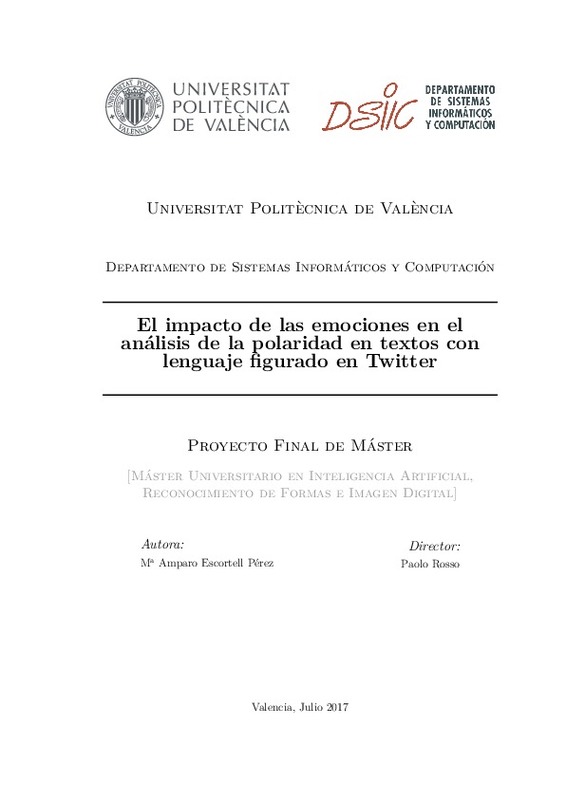JavaScript is disabled for your browser. Some features of this site may not work without it.
Buscar en RiuNet
Listar
Mi cuenta
Estadísticas
Ayuda RiuNet
Admin. UPV
El impacto de las emociones en el análisis de la polaridad en textos con lenguaje figurado en Twitter
Mostrar el registro sencillo del ítem
Ficheros en el ítem
| dc.contributor.advisor | Rosso, Paolo
|
es_ES |
| dc.contributor.author | Escortell Pérez, María Amparo
|
es_ES |
| dc.date.accessioned | 2017-09-01T06:29:35Z | |
| dc.date.available | 2017-09-01T06:29:35Z | |
| dc.date.created | 2017-07-25 | |
| dc.date.issued | 2017-09-01 | es_ES |
| dc.identifier.uri | http://hdl.handle.net/10251/86127 | |
| dc.description.abstract | [EN] During the recent years we have seen how the rise of Web 2.0 and social media have caused users to take more and more prominence on the Internet, being a source of information generation that increases day by day. Focusing on the social network Twitter, one of the most complex challenges facing Natural Language Processing is to determine the polarity of a tweet (positive, negative or neutral) when in it appears figurative language. This work presents an exhaustive study about the capacity of different lexical resources of emotions to analyze the polarity of a set of data extracted from Twitter, detailing the impact of each one of the resources about different forms of figurative language such as irony and sarcasm we found profusely in this corpus. We start from the hypothesis that not all the available resources favor the detection of polarity with an equal measure, therefore we carry out a series of experiments to evaluate how they affect different lexical resources of emotions in the figurative language as in the literal one. Our methodology will be carried out in two phases: in the first one, we will study the impact of lexical resources on the training of classifiers that predict the polarity of the complete set of tweets of task 11 of SemEval2015. In the second, we will evaluate in detail the impact of each of the resources for the different typologies of figurative language present in this corpus. The obtained results show indications that the inclusion of information related to emotions helps to correctly classify polarity both globally and at the level of figurative or literal language. Therefore, it may be of big importance to develop techniques capable of representing the information in such a way that it is possible to classify the feeling that the user tries to transmit in a text. | es_ES |
| dc.description.abstract | En los últimos años hemos visto como el auge de los medios sociales ha provocado que los usuarios tomen cada vez más protagonismo en Internet, siendo estos una fuente de generación de información que aumenta día tras día. Centrándonos en la red social Twitter, uno de los retos más complejos a los que se enfrenta el Procesamiento de Lenguaje Natural es el de determinar la polaridad de un tweet (positiva, negativa o neutra) cuando en éste aparece lenguaje figurado. Actualmente existe un gran interés en el estudio de las emociones en los textos, ya que se dispone de una multitud de plataformas en las que el usuario puede interactuar mostrando sus ideas, opiniones, comparaciones entre multitud de productos, etc. y de las que se puede extraer abundante información. Sin embargo, esta tarea es especialmente compleja cuando en el texto encontramos lenguaje figurado, puesto que nos enfrentamos con distintos significados debido al uso de la ironía, la metáfora o el sarcasmo, por lo tanto la polaridad del significado literal puede contrastar fuertemente con el sentimiento que pretende transmitir el sentido figurado. Este trabajo presenta un estudio exhaustivo sobre la capacidad de distintos recursos léxicos de emociones para analizar la polaridad de un conjunto de datos extraídos de Twitter, detallando el impacto de cada uno de los recursos sobre distintas formas de lenguaje figurado como pueden ser la ironía y el sarcasmo que encontramos profusamente en este corpus. | es_ES |
| dc.language | Español | es_ES |
| dc.publisher | Universitat Politècnica de València | es_ES |
| dc.rights | Reconocimiento (by) | es_ES |
| dc.subject | Análisis de sentimientos | es_ES |
| dc.subject | Polaridad | es_ES |
| dc.subject | Semeval | es_ES |
| dc.subject | Sarcasmo | es_ES |
| dc.subject | Ironía | es_ES |
| dc.subject | es_ES | |
| dc.subject | Lenguaje figurado | es_ES |
| dc.subject | Emociones | es_ES |
| dc.subject.classification | LENGUAJES Y SISTEMAS INFORMATICOS | es_ES |
| dc.subject.other | Máster Universitario en Inteligencia Artificial, Reconocimiento de Formas e Imagen Digital-Màster Universitari en Intel·Ligència Artificial: Reconeixement de Formes i Imatge Digital | es_ES |
| dc.title | El impacto de las emociones en el análisis de la polaridad en textos con lenguaje figurado en Twitter | es_ES |
| dc.type | Tesis de máster | es_ES |
| dc.rights.accessRights | Abierto | es_ES |
| dc.contributor.affiliation | Universitat Politècnica de València. Departamento de Sistemas Informáticos y Computación - Departament de Sistemes Informàtics i Computació | es_ES |
| dc.description.bibliographicCitation | Escortell Pérez, MA. (2017). El impacto de las emociones en el análisis de la polaridad en textos con lenguaje figurado en Twitter. http://hdl.handle.net/10251/86127 | es_ES |
| dc.description.accrualMethod | TFGM | es_ES |
| dc.relation.pasarela | TFGM\69520 | es_ES |






